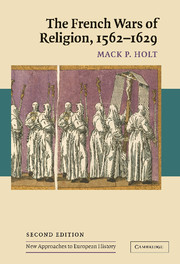Book contents
- Frontmatter
- Contents
- List of maps and figures
- Acknowledgements
- Preface to the Second Edition
- Chronological table of events
- Introduction
- 1 Prologue: Gallicanism and reform in the sixteenth century
- 2 ‘The beginning of a tragedy’: the early wars of religion, 1562–1570
- 3 Popular disorder and religious tensions: the making of a massacre, 1570–1574
- 4 The rhetoric of resistance: the unmaking of the body politic, 1574–1584
- 5 ‘Godly warriors’: the crisis of the League, 1584–1593
- 6 Henry IV and the Edict of Nantes: the remaking of Gallicanism, 1593–1610
- 7 Epilogue: the last war of religion, 1610–1629
- 8 Conclusions: economic impact, social change, and absolutism
- Genealogical charts
- Brief biographies
- Suggestions for further reading
- Index
- NEW APPROACHES TO EUROPEAN HISTORY
2 - ‘The beginning of a tragedy’: the early wars of religion, 1562–1570
Published online by Cambridge University Press: 05 June 2012
- Frontmatter
- Contents
- List of maps and figures
- Acknowledgements
- Preface to the Second Edition
- Chronological table of events
- Introduction
- 1 Prologue: Gallicanism and reform in the sixteenth century
- 2 ‘The beginning of a tragedy’: the early wars of religion, 1562–1570
- 3 Popular disorder and religious tensions: the making of a massacre, 1570–1574
- 4 The rhetoric of resistance: the unmaking of the body politic, 1574–1584
- 5 ‘Godly warriors’: the crisis of the League, 1584–1593
- 6 Henry IV and the Edict of Nantes: the remaking of Gallicanism, 1593–1610
- 7 Epilogue: the last war of religion, 1610–1629
- 8 Conclusions: economic impact, social change, and absolutism
- Genealogical charts
- Brief biographies
- Suggestions for further reading
- Index
- NEW APPROACHES TO EUROPEAN HISTORY
Summary
When the Parisian lawyer and historian Etienne Pasquier heard the news of the massacre at Vassy, his reaction was typical of many among the upper classes. ‘All one talks about now is war … [and] there is nothing to be more feared in a state than civil war … particularly when a king, due to his minority, does not have the power to command absolutely … If it was permitted to me to assess these events, I would tell you that it was the beginning of a tragedy.’ What must have particularly worried elites such as Pasquier was the likely prospect that religious division would exacerbate the social tensions inherent in the hierarchical society of the Old Regime. And this seemed a well-founded fear when in the aftermath of the incident at Vassy a number of powerful nobles seized the leadership of the Huguenot movement. Military figures such as Condé and Coligny naturally assumed the military command of the Huguenot army in an effort to defend what they saw as an organized attempt by French Catholics to eliminate them by force. But there were also large numbers of noble converts to the new religion in the provinces, especially in the south. While these converts provided much needed political and military protection, as well as the safety and security of places of worship on their rural estates, they further exacerbated existing social tensions.
- Type
- Chapter
- Information
- The French Wars of Religion, 1562–1629 , pp. 50 - 75Publisher: Cambridge University PressPrint publication year: 2005

